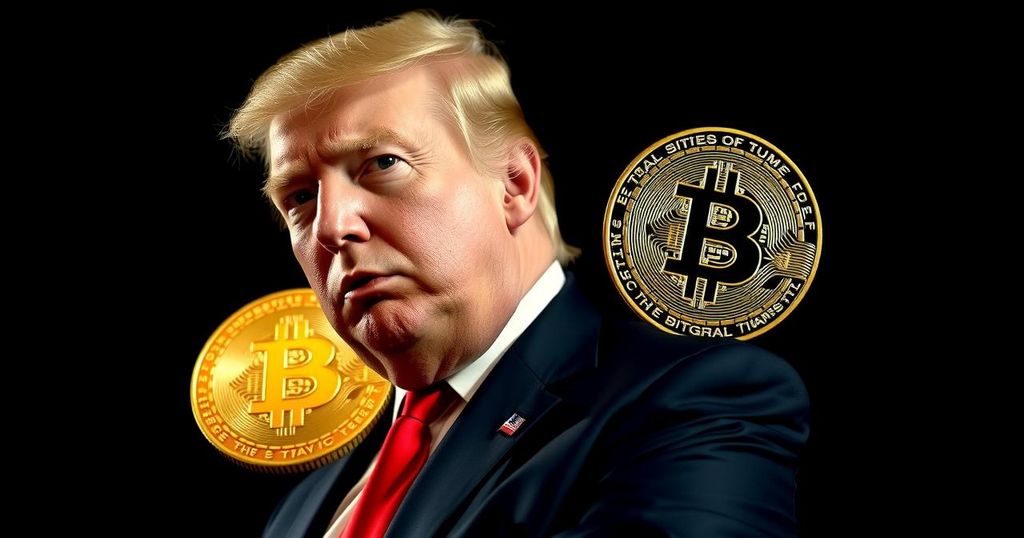Scott Bessent’s Nomination as Treasury Secretary: A Pro-Crypto Shift for the U.S.
President-elect Donald Trump has nominated Scott Bessent for Treasury Secretary, signaling a pro-crypto shift. Bessent, a seasoned advocate for blockchain, may implement favorable policies for cryptocurrencies, contrasting with the Biden administration’s cautious stance. His confirmation could establish clearer regulations, though challenges remain regarding bipartisan support and potential impacts on retail investors.
President-elect Donald Trump has announced the nomination of Scott Bessent as Treasury Secretary, marking a significant pro-crypto shift in U.S. policy. Bessent, a well-known advocate for cryptocurrencies and blockchain technology, has a notable background as a chief investment officer for George Soros and the founder of Key Square Capital Management. If confirmed, he could implement policies favoring digital assets, potentially integrating them into mainstream finance and contrasting sharply with the current administration’s regulatory stance led by Treasury Secretary Janet Yellen.
Bessent has long championed the transformative capabilities of blockchain, stating, “Crypto is about freedom and the crypto economy is here to stay. Crypto is bringing in young people, people who have not participated in markets.” His proactive investments in blockchain and decentralized finance further underscore his commitment to the sector’s growth. This perspective diverges significantly from Yellen’s caution regarding the risks associated with cryptocurrencies.
Trump’s increasing interest in digital assets aligns with Bessent’s nomination. During his campaign, Trump became the first presidential candidate to accept cryptocurrency donations, emphasizing his willingness to embrace innovation. He even suggested the idea of a federal Bitcoin reserve, declaring, “For too long, our government has violated the cardinal rule that every bitcoiner knows by heart: Never sell your Bitcoin.”
The potential confirmation of Bessent is seen as a pivotal moment for crypto regulation. Industry advocates hope he can establish a coherent regulatory framework that has been lacking under the current administration, which has caused uncertainty in the market. Ripple CEO Brad Garlinghouse captured this sentiment on social media, referring to Bessent as “the most pro-innovation, pro-crypto Treasury Secretary we’ve ever seen.”
However, some analysts caution that Bessent’s experience may favor institutional investors over retail participants. Furthermore, any significant alterations to policy would require Congressional approval, facing challenges due to ongoing bipartisan concerns regarding fraud and environmental issues in the crypto space.
If Bessent assumes the role of Treasury Secretary, he will straddle the difficult line between encouraging financial innovation through blockchain and ensuring necessary regulatory safeguards. His advocacy for “smart regulation” reflects an intention to promote growth while maintaining oversight. While welcoming Bessent’s nomination, the industry must still navigate considerable regulatory and political hurdles, as the road ahead remains complex and uncertain.
The article discusses the potential implications of Scott Bessent’s nomination as Treasury Secretary under Donald Trump, a candidate who has expressed support for cryptocurrencies. Bessent’s pro-crypto stance contrasts sharply with the prevailing Biden administration policies, focusing on regulatory caution due to perceived risks associated with cryptocurrencies. This backdrop highlights the evolving landscape of crypto regulation and market dynamics as they could be influenced by Bessent’s confirmation and leadership.
Scott Bessent’s nomination as Treasury Secretary represents a significant pro-crypto direction for U.S. policy under President-elect Trump. His commitment to blockchain innovation and his contrasting views on regulatory measures compared to the current administration offer a promising outlook for the crypto industry. However, challenges remain, including potential bias toward institutional investors and the need for Congressional consensus on major policy changes. The implications of his leadership could shape the future of digital assets in the financial system.
Original Source: www.forbes.com








Post Comment